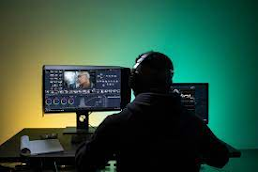Some important facts about Artificial Intelligence
- Get link
- X
- Other Apps
Nowadays, every industry has been significantly affected by artificial intelligence, AI has also given creators new tools and capabilities to increase the quality and reach of their content.
How AI helps Vloggers and Bloggers?
Editing videos: AI-powered video editing software can automate the editing process, making it faster and simpler for creators to create high-quality videos. Tools, for instance, can automatically add music and sound effects, adjust lighting, and remove shaky footage.
Content Analysis: Vlog creators can gain insight into their audience and how they interact with their content with the help of algorithms. Creators can use this information to improve their content for more reach and engagement.
Personalization: Vloggers and influencers can use artificial intelligence to tailor their content to their audience's specific requirements and interests. Topics and content that are likely to be of interest to specific audiences can be suggested by algorithms after they examine viewer data.
Audience targeting: Vloggers and influencers can use AI-powered tools to identify and target specific audience segments with targeted content. For instance, artificial intelligence algorithms have the capability of analyzing viewer data to identify demographics and interests, enabling creators to gain insight into the most effective strategies for reaching those audiences.
Influencer marketing: With AI-powered marketing platforms, brands can find the most relevant and effective influencers for their campaigns. Brands can make better decisions about their partnerships with the help of AI algorithms that can analyze their data and provide insights into their audience and engagement metrics.
In general, artificial intelligence (AI) has made it possible for vloggers and influencers to create and distribute new content, interact with their audiences, and monetize their influence.
How Does AI have an impact on every industry?
Healthcare: Medical image analysis, drug discovery, personalized treatment planning, and disease prediction are all applications of AI in healthcare. Chatbots powered by AI also provide 24/7 patient support.
Finance: In finance, AI is used to find fraud, evaluate risks, manage investments, and provide customer service. To identify market trends and make informed investment decisions, algorithms can analyze vast amounts of financial data.
Retail: Retail uses AI for personalized marketing, demand forecasting, and inventory management. Chatbots powered by AI can be used by retailers to provide individualized customer support and enhance the shopping experience as a whole. How AI can benefit the retail sector?
Manufacturing: AI is utilized in assembling predictive maintenance, quality control, and production enhancement. Robots powered by AI can automate dangerous and repetitive tasks, resulting in increased productivity and efficiency.
Transportation: Autonomous driving, predictive maintenance, and route optimization are all applications of AI in transportation. Additionally, vehicles can be monitored by AI-powered sensors, allowing for early detection of potential issues.
Education: Personalized learning, student performance analysis, and automated grading all make use of AI in education. Chatbots powered by AI can also support students 24/7 by responding to inquiries and providing feedback in real-time.
These are just a few examples of the applications of AI in various fields. We can anticipate seeing even more novel applications in the future as technology advances.
Will AI replace some of the human jobs?
Artificial intelligence is already replacing some human jobs, and this trend is likely to continue. The ability of AI technology to automate routine, data-driven, and repetitive tasks, which can reduce the need for human labor in some industries, continues to advance.
In manufacturing, for instance, AI-powered robots can put together products, check for quality control, and do maintenance work. Artificial intelligence can analyze vast amounts of data in finance to identify market trends and make investment decisions, reducing the need for human financial analysts.
However, it is essential to keep in mind that AI cannot take the place of all human occupations. Human skills like creativity, emotional intelligence, critical thinking, and problem-solving are difficult for AI to duplicate in many tasks. AI is less likely to replace jobs that require these skills, like those in social services, education, and healthcare.
In addition, artificial intelligence has the potential to both create new jobs and eliminate existing ones. For instance, as AI technology develops, there will be greater demand for individuals who are capable of developing and maintaining AI systems as well as interpreting and analyzing the data generated by these systems.
In conclusion, although artificial intelligence is likely to take over some human jobs, it will not take over all jobs. Many jobs will still require human expertise, and AI technology may lead to the creation of new jobs.
- Get link
- X
- Other Apps








Comments
Post a Comment